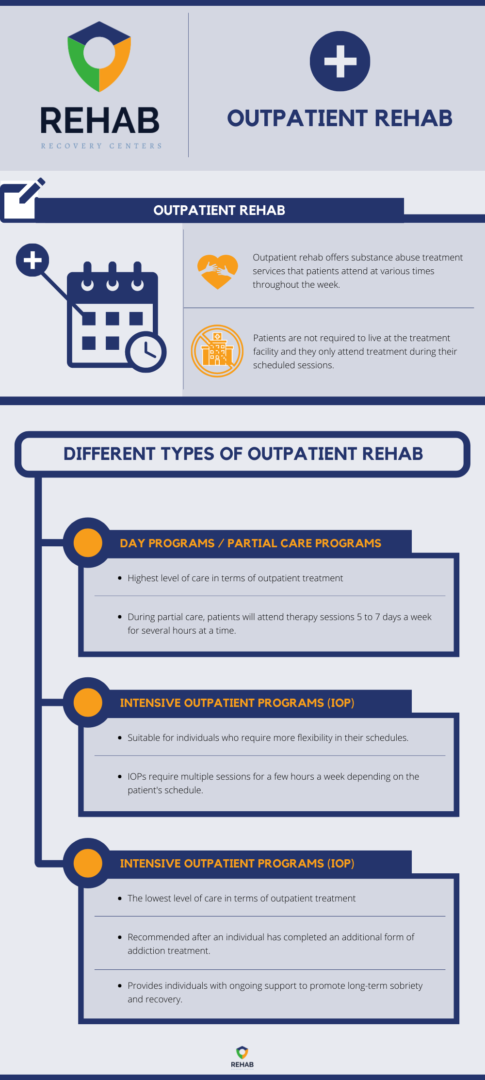Table of Contents
Severe addictions and substance use disorders, such as oxycodone or heroin addiction, are best treated in an inpatient or residential addiction treatment program. This is because individuals suffering from severe addictions require medical detoxification programs and 4/7 monitoring.
However, mild to moderate addictions that are caught in the early stages can often be treated on an outpatient basis. Outpatient rehab is best suited for individuals with less severe substance abuse issues. Additionally, individuals who cannot commit to residential programs due to responsibilities, such as work, school, or parenting, should look into outpatient addiction treatment programs.

Outpatient Rehab: Understanding The Basics
Outpatient programs offer substance abuse treatment on a non-residential basis. The sessions can be scheduled around busy schedules, allowing patients to continue meeting their regular responsibilities while living at home and receiving the addiction treatment they need. While living at home, patients will still be expected to arrive for their counseling sessions on-time and continue taking their medications.
Outpatient treatment is conducted in several different formats, with each type offering varying levels of care. Additionally, each program will provide different services and amenities. However, the general focus of every outpatient rehab is addiction therapy, psychoeducation, and sober support. People who have a strong will to be successful in recovery, are committed to their treatment plan, and disciplined will benefit the most from an outpatient substance abuse treatment program.
What are the Types of Outpatient Rehab?
The different types of outpatient programs available provide the most effective and personalized treatment plan possible. While there are many different types of outpatient programs, including gender-specific and even LGBTQ-specific programs, the general types of outpatient treatment fall into three categories.
Day Programs/Partial Hospitalization
Day programs provide patients with the highest level of care and structure possible within an outpatient setting. While attending a day program, patients are expected to commit to meeting several days per week at the rehab center for 4-6 hours each session. During this time, patients participate in individual counseling, group therapy, relapse prevention education, and other evidence-based therapies, such as art or music therapy.
Patients are allowed to return home after each session, either to their families, a sober living home, or a halfway house. However, day programs require a considerable time commitment, which may prevent an individual from being able to work or go to school on a full-time basis until the program is completed. It is important to note that day programs require less commitment than a residential or inpatient facility, making this a small step down from those types of programs.
Intensive Outpatient Programs (IOP)
Intensive outpatient programs (IOPs) provide each patient with an individualized treatment plan that consists of specific milestones that are used to help indicate a patient’s progress in their recovery program. As these recovery-based milestones are achieved, the patient’s time commitment required per week at rehab will decrease.
This form of outpatient rehab is a good option for individuals who are serious about achieving sobriety from drugs and alcohol but still need to be able to attend work and complete daily responsibilities. IOP programs often require multiple sessions each week that last for a few hours each time. During this time, patients will attend 12-step meetings, individual therapy, group sessions, and psychoeducational classes.
Aftercare Support
Peer support groups, like 12-step support groups such as Alcoholics Anonymous (AA) or Narcotics Anonymous (NA), provide ongoing support resources to help people maintain their sobriety and commitment to recovery. These groups are usually facilitated by peer members of the group and meet on a weekly basis. While some continuing care groups are gender-specific or age-specific, others may focus on a particular aspect of recovery (such as the 12-steps) or a particular substance of abuse.
How People Can Benefit for Outpatient Rehab
For individuals who suffer from mild to moderate addictions, outpatient is the ideal choice for addiction treatment. While there are many other treatment options, outpatient programs provide the most benefits for individuals who need to continue completing daily responsibilities. In other words, these programs are more accessible and flexible than inpatient or residential programs.
The most notable benefits of outpatient rehab include:
- Cost of treatment – Patients are able to live at home during outpatient treatment so they aren’t responsible for paying the costs of housing and 24/7 care at an inpatient facility. This makes outpatient far more affordable and low-cost than inpatient treatment.[1]
- Flexible schedules – Outpatient programs typically work around each patient’s schedule. This is beneficial for people who don’t have the ability to leave their job or care for their families while in rehab for several weeks or months at a time.
- Access to friends, family, and sober support – During outpatient rehab programs, family involvement and support is encouraged. This is because loved ones have a great ability to help encourage their loved ones to stay on the path to sobriety.[2]
Find an Outpatient Treatment Program Near You
Deciding which type of substance abuse treatment is right for you isn’t always easy. Whether you are looking into outpatient rehab or an alternative form of addiction treatment, it’s important to take the first step towards recovery: asking for help.
If you or a loved one are in need of addiction treatment and are interested in outpatient rehab, contact us today. Rehab Recovery Centers can help you to find the best outpatient rehab in your city.
References:
Get Help Today
Don’t go through the process of recovery alone. There are people who can help you with the struggle you’re facing. Get in touch with one today.


